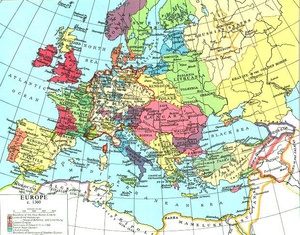Napoleon’s dictatorship came swiftly after the French revolution of 1789-1999. But there have been many other revolutions over time. There are many times and events in history that really stand out for various reasons. Some for good reasons such as the bravery or dedication of certain individuals such as Florence Nightingale or Emily Pankhurst; but more often than not for bad reasons such as the Spanish Inquisition or the era of slavery.
Knights of the Round Table
One period that really captures many peoples' imagination, though, is the Knights of the Round Table, led by good old King Arthur. This has been captured time and time again in books and on television and it never fails to attract attention. You can always forge a good story out of King Arthur and his knights!
Whether it is Castle Sieges in Games or battles against the invaders, it is a real tale of bravery and adventure. Famous characters such as Sir Lancelot, Sir Galahad, Sir Gawain and Sir Percival spring alive from the history books with their gallant deeds and acts of courage.
Then there is the fair Lady Guinevere, abducted by the wicked king Melwas and rescued one year later and reunited with King Arthur, only, as some of the tales say, to fall in love with Sir Lancelot.
These were times of damsels in distress; and knights in shining armour come to save them. The old tales tell different stories and much of it is left to our imagination.
Revolutions in the past
Revolutions were a lot cooler back when technology wasn't available. When the world wasn't full of computers and people looking for iphone insurance people had to communicate the 'old fashioned' way with covert messages and hidden printing presses. The Russian Revolution in 1905 wasn't organised via Twitter or Facebook but covertly by secret messages and underground gatherings. Whilst some aspects of this (covert meetings) is still true today the invention of mobile phones and computers have made the process a lot easier.
Dangers of technology
With the ease that technology brings to the process it also brings caution as well. It is very easy to send out multiple Facebook messages on your iPhone but it also very easy to get caught this way. Social media sites such as Facebook have come under fire recently over their privacy issues so if you are not careful enough you might find yourself getting caught.
The current uprising in the Middle East shows the power that technology has and how significant it has been in this revolt. Live updates through Twitter and blogging have helped shape the revolution and how the world sees the struggles in Libya. The same was true for the recent and successful uprising in Egypt. Using social media sites such as Twitter and Facebook can help mobilise people in a very short space of time and with the invention of smart phones like the iPhone the ease in which crowds can be mobilised can thwart any authorities.
What is history but a record of things said and done in the past? However, history is a more interesting and complex subject than it gets credit for. Not only is history selective, but it can also be created.
<13'>